新版人教版新目标九年级英语Unit14全套教案
人教版新目标九年级英语Unit14SectionA1(1a2d)第一课时教学设计
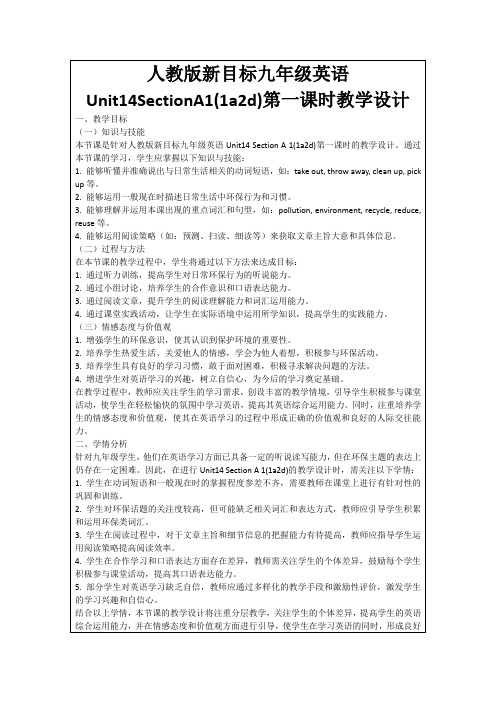
6.课堂实践:设计角色扮演、小组讨论等实践活动,让学生在实际语境中运用所学知识,提高实践能力。
7.巩固拓展:通过课后作业和拓展活动,巩固学生对本节课知识点的掌握,并提高学生的语言运用能力。
8.情感教育:在课堂教学中,适时融入环保意识和价值观的引导,让学生在学习英语的同时,树立正确的价值观。
4.教师鼓励学生在日常生活中践行环保行为,将所学知识运用到实际中。
(四)课堂练习
1.教师设计不同层次的练习题,让学生运用一般现在时和所学词汇进行句子编写和口语练习。
2.学生进行听力训练,完成与环保行为相关的听力任务,提高听说能力。
3.教师组织学生进行角色扮演,模拟日常环保场景,让学生在实际语境中运用所学知识。
2.口语练习:学生分角色扮演,模拟日常环保场景,进行口语交流。要求每组录制一段2-3分钟的对话视频,展示所学知识在实际语境中的应用。此作业旨在提高学生的口语表达能力,增强合作意识。
3.阅读理解:教师提供一篇关于环保的文章,要求学生运用扫读和细读等阅读策略,获取文章主旨和细节信息。学生完成阅读后,回答相关问题,提高阅读理解能力。
2.能够运用一般现在时描述日常生活中环保行为和习惯。
3.能够理解并运用本课出现的重点词汇和句型,如:pollution, environment, recycle, reduce, reuse等。
4.能够运用阅读策略(如:预测、扫读、细读等)来获取文章主旨大意和具体信息。
(二)过程与方法
在本节课的教学过程中,学生将通过以下方法来达成目标:
二、学情分析
针对九年级学生,他们在英语学习方面已具备一定的听说读写能力,但在环保主题的表达上仍存在一定困难。因此,在进行Unit14 Section A 1(1a2d)的教学设计时,需关注以下学情:
人教版新目标九年级英语unit14教案(含习题)

Unit 14 Have you packed yet?学习目标:1.综合复习各种基本时态,包括现在完成时态、一般现在时、一般过去时、一般将来时等;按类别复习词汇。
2.谈论近来发生的事件及对未来的计划。
3.增强学生做事的条理性及计划性。
一、词汇(一)基础词汇bathing 游泳,洗澡suit衣服,服装towel毛巾,手巾water浇灌,浇水guidebook 旅游手册,指南refrigerator 冰箱garage 汽车库,汽车间suitcase 小提箱,衣箱chop 砍,劈wood木头,木材light点燃,点着village乡村,村庄well 井,水井farm农场,农庄member 成员,会员,一份子scene (戏剧、歌剧等)的发生地点,背景last最近的,最后的major 较大的,较大的范围的hit成功而轰动一时的事物(如歌曲等) appear出现,露面,(公开)演出miss错过,遗漏lead 领导,主角mostly主要的,大部分air(音乐)曲调,旋律,乐曲poem诗,韵文(二)重点短语1. some day来日,有一天2. be off离开,走开3. bathing suit游泳衣4. water the plants浇花儿5. lock the windows锁窗子6. pack the camera把照相机装包里7. put in放进,进入8. turn off关闭9. clean out something清除某物内部使之整洁10. clean up something整洁,清理某物11. take the dog for a walk遛狗12. chop wood砍柴13. love doing something喜爱做某事14. light the fire for breakfast点火做早饭15. collect water 挑水16. write original songs写原创歌曲17. make a music video制作音乐录影带18. a hit CD一张流行的CD19. go on a world tour进行世界巡20. in search of寻找,寻求21. hope to do something 希望做某事22. so far迄今为止23. be sure (not) to do一定(不)要做某事24. spend time (in) doing花费时间做…25. think of 想到,考虑26. turning point转折点27. in one‟s life在某人的一生28. be off to离开去(某地)29. air show音乐表演二、日常用语1.Have you watered the plants? No,I haven’t.你已经浇花了吗?不,我没有。
人教版九年级英语全册Unit14SectionA(3a3c)教学设计

3.学生能够在听力活动中,理解并获取关键信息,如他人的兴趣爱好、日常活动安排等,并能够进行有效的信息筛选和整合。
4.学生能够在口语交流中,用英语自信地表达自己的个人喜好、日常活动和计划,并能够进行简单的讨论和交流。
(三)情感态度与价值观
1.培养学生尊重他人、包容他人的态度,使学生认识到每个人都有自己的独特喜好和生活方式,学会理解和接纳他人。
2.培养学生合理安排时间、制定计划的意识,让学生明白合理规划生活的重要性,养成良好的生活习惯。
3.激发学生对英语学习的兴趣,提高学生的自信心,鼓励学生在课堂上积极参与、主动表达,形成积极向上的学习氛围。
-每个分类至少包含5个词汇和短语;
-为每个词汇和短语提供例句;
-拓展词汇时,注意词性和词义。
5.预习作业:预习下一节课的内容,提前了解话题和背景知识。要求:
-阅读下一节课的教材,了解主要内容和语法点;
-搜集相关资料,为课堂学习做好准备;
-撰写预习笔记,记录自己的疑问和心得。
b.在小组活动中,注意分工合作,让每个学生都能发挥自己的优势,提高团队协作能力。
4.强化学习策略的指导,培养学生的自主学习能力:
a.教授学生如何利用词典、网络资源等工具进行词汇学习和拓展。
b.引导学生总结语法规则,形成语法知识网络,提高语法运用能力。
c.教会学生如何合理安排学习时间,制定学习计划,形成良好的学习习惯。
b.学生分组讨论,运用一般将来时和一般现在时描述个人喜好和计划安排。
c.各小组汇报讨论成果,教师给予评价和指导。
3.教学目的:培养学生的合作意识和口语表达能力,提高学生运用所学知识进行实际情境交流的能力。
九年级英语全册Unit14HaveyoupackedityetSectionB3a4教案人教新目标版
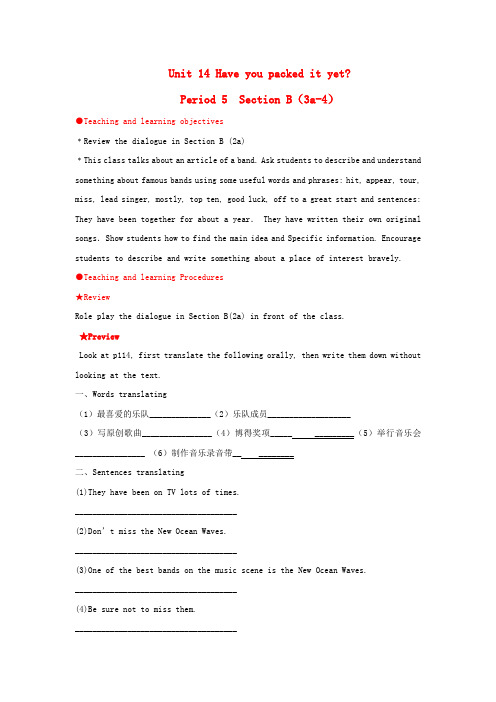
Unit 14 Have you packed it yet?Period 5 Section B(3a-4)●Teaching and learning objectives﹡Review the dialogue in Section B (2a)﹡This class talks about an article of a band. Ask students to describe and understand something about famous bands using some useful words and phrases: hit, appear, tour, miss, lead singer, mostly, top ten, good luck, off to a great start and sentences: They have been together for about a year. They have written their own original songs.Show students how to find the main idea and Specific information. Encourage students to describe and write something about a place of interest bravely.●Teaching and learning Procedures★ReviewRole play the dialogue in Section B(2a) in front of the class.★PreviewLook at p114, first translate the following orally, then write them down without looking at the text.一、Words translating(1)最喜爱的乐队______________(2)乐队成员___________________(3)写原创歌曲________________(4)博得奖项_____ _________(5)举行音乐会________________ (6)制作音乐录音带__ ________二、Sentences translating(1)They have been on TV lots of times._____________________________________(2)Don’t miss the New Ocean Waves._____________________________________(3)One of the best bands on the music scene is the New Ocean Waves._____________________________________(4)Be sure not to miss them._____________________________________(5)We really hope to have a number one hit some day._____________________________________(6)Good luck to the New Ocean Waves._____________________________________设计思路:预习表现了以学生为中心的思想,强调学生的参与、体验、感知、实践和交流,以学定教。
人教版英语九年级全册Unit14SectionB1(1a1e)教学设计

(一)教学重难点
1.重点:
(1)掌握本节课的核心词汇和短语,如:destiny, talent, devoted, ambition等。
(2)运用一般过去时、一般现在时和一般将来时描述名人的生平事迹。
(3)提高学生的听力、口语、阅读和写作能力。
2.难点:
(1)正确运用一般过去时、一般现在时和一般将来时,避免混淆。
2.每组选取一位代表进行汇报,分享讨论成果。
(四)课堂练习
1.教师设计以下练习,巩固所学知识:
(1)填空题:结合课文内容,用一般过去时、一般现在时和一般将来时填空。
(2)选择题:根据听力材料,选择正确的答案。
(3)写作题:仿照课文,写一篇关于自己偶像的文章。
2.学生独立完成练习,教师给予反馈和指导。
二、学情分析
针对人教版英语九年级全册Unit14SectionB1(1a1e)的教学内容,对学生学情进行分析如下:
1.学生在九年级阶段已经具备了一定的英语基础,能够运用简单的英语进行交流,但在词汇、语法、听力等方面仍有待提高。
2.学生对于名人的了解大多停留在表面,对于名人的生平事迹、成就及其影响了解不足,需要通过本节课的学习,拓宽知识面,提高文化素养。
3.学生在英语学习过程中,自主学习能力较弱,需要教师在教学中加以引导,培养学生的学习兴趣和自主学习能力。
4.学生在合作学习方面有一定的基础,但部分学生在小组讨论中表现不够积极,需要教师激发学生的参与热情,提高合作学习效果。
5.学生在情感态度方面,正处于青春期,对生活充满好奇,但部分学生对自己的未来缺乏明确目标,需要通过本节课的学习,激发学生的理想与信念,培养其积极向上的人生态度。
(二)过程与方法
人教版九年级英语全册Unit14SectionA(1a2d)教学设计
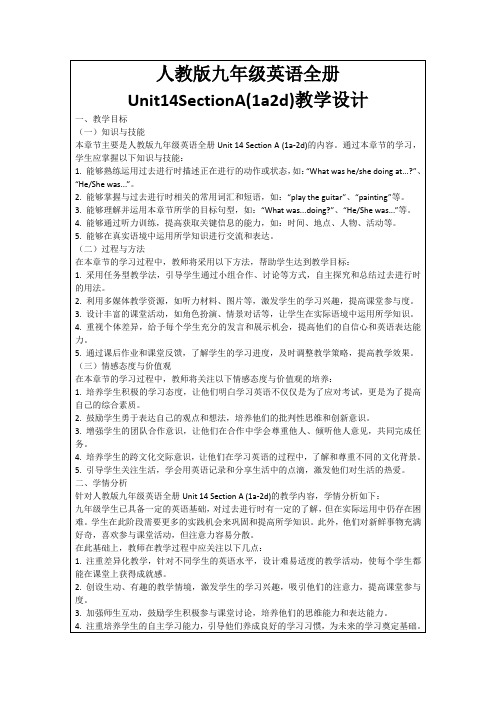
a.完成课本练习册中与本节课相关的练习题,包括填空、选择、改错等,以加强学生对过去进行时知识的掌握。
b.根据课堂所学,编写一段对话,至少包含5个过去进行时的句子,要求内容生动、有趣,能够体现过去进行时在实际语境中的应用。
c.挑选一篇短文,将其中的现在进行时句子改为过去进行时,以加深学生对两种时态区别的理解。
4.差异化教学:
a.针对英语基础较好的学生,设计更具挑战性的练习,提高他们的语言运用能力。
b.对于基础较弱的学生,给予更多的关注和指导,确保他们掌握基本的过去进行时知识。
5.课后巩固:布置富有针对性的课后作业,如听力练习、口语模仿、写作任务等,帮助学生巩固所学知识。
6.评价与反馈:
a.采用形成性评价,关注学生的学习过程,及时发现并解决问题。
2.总结过去进行时的关键点,如:句型结构、动词形式变化等。
目的:帮助学生梳理知识体系,提高他们的记忆效果。
3.强调过去进行时在日常生活和学习中的应用,鼓励学生在课后多加练习。
目的:培养学生的自主学习意识,激发他们学习英语的兴趣。
五、作业布置
为了巩固本章节所学内容,确保学生对过去进行时的理解和运用,特布置以下作业:
在此环节,我将组织学生进行小组讨论:
1.将学生分成若干小组,让他们相互讨论过去进行时的用法,并分享学习心得。
目的:培养学生的合作精神,提高他们的交流能力。
2.每个小组挑选一个代表进行汇报,展示他们的讨论成果。
目的:增强学生的自信心,锻炼他们的表达能力。
3.鼓励其他学生提出问题或补充观点,共同完善对过去进行时的理解。
2.鼓励学生勇于表达自己的观点和想法,培养他们的批判性思维和创新意识。
3.增强学生的团队合作意识,让他们在合作中学会尊重他人、倾听他人意见,共同完成任务。
新目标九年级英语全册UNIT14精品教学案
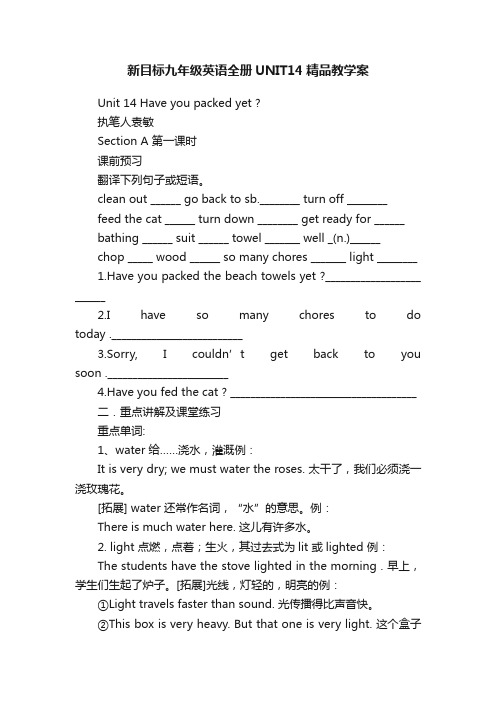
新目标九年级英语全册UNIT14精品教学案Unit 14 Have you packed yet ?执笔人袁敏Section A 第一课时课前预习翻译下列句子或短语。
clean out ______ go back to sb.________ turn off ________feed the cat ______ turn down ________ get ready for ______bathing ______ suit ______ towel _______ well _(n.)______chop _____ wood ______ so many chores _______ light ________1.Have you packed the beach towels yet ?___________________ ______2.I have so many chores to do today .__________________________3.Sorry, I couldn’t get back to you soon .________________________4.Have you fed the cat ? _____________________________________二.重点讲解及课堂练习重点单词:1、water 给……浇水,灌溉例:It is very dry; we must water the roses. 太干了,我们必须浇一浇玫瑰花。
[拓展] water 还常作名词,“水”的意思。
例:There is much water here. 这儿有许多水。
2. light 点燃,点着;生火,其过去式为lit 或lighted 例:The students have the stove lighted in the morning . 早上,学生们生起了炉子。
Unit 14 Section B(1a-1e)教案 2023-2024学年人教版英语九年级全册

Unit14 SectionB(1a-1e)教学目标1.扎实掌握重点单词和短语:degree,manager,get a business degree,became manager,believe in sb.等。
2.通过听力和合作学习,谈论自己将来希望做的事情,并写一篇英语演讲稿在全班展示。
3.遇到问题努力寻找解决方法,培养自己爱学习的好品质。
教学难点1. 通过听力和合作学习,谈论自己将来希望做的事情,并写一篇英语演讲稿在全班展示。
2. 能听懂有关谈论学生们希望在未来做什么的话题并进行自由交际。
教学过程一、Let’s look, think and say.Morning, everyone! Well, today is our last class together.This is Ms. Jobs, a counselor. She will give you some proper advice about your future.What do you hope to do in the future?Let’s guess.What do you hope to do in the future?I’d like to be _____________________ and _____________.What do you hope to do in the future?I hope to ___________________ and _____________.What do you hope to do in the future?I’d like to be ______________ and ____________________________.1aWrite about what you would like to do in the future.1bPair work: Talk about what you hope to do in the future.A: What do you hope to do in the future?B: …A: What things have you done for your dream?B: …A: What are you doing/will you do for your dream?B: …A: How are you going to achieve it?B: ...1cListen to a class discussion. Check (✔) the hopes you hear.What is the topic of the discussion?What is the topic of the discussion?What’s his/her name? Listen.What do they hope to do in the future?1dListen again. Complete the passage.Today is the students’ last class. Bob feels ____ about it and thinks Mrs. Chen’s classes have been _____. The students talk about what they want to do in the future. Bob hopes to _____ the exam to get into senior high school. Shirley wants to get into a ______ school. Ken is good at _______ and he won a _____ for it. So he wants to be a(n) _________.Mrs. Chen believes in all of them and tells them to “ _________”. To celebrate the end of junior high, they are having a ______. They ask Mrs. Chen to come, and she is happy to accept the invitation.Let’s create.How do you feel when you hear it is your last class?Who has helped you most?I think Mrs. Chen. We all think her classes _______________What will you do after you graduate?I hope to ___________________________What advice has your teacher given you?Mrs. Chen ______________________ andWhat are you looking forward to?I’m looking forward to _____________________Bob has a speech for his graduation.Hello, everyone! I’m Bob. I’m so sad that here we are at the end of junior school. We have studied and lived together for three years in our school. I really learned a lot from you all, my dear teachers and friends. I have improved my English a lot with the help of my teacher Mrs. Chen. Mrs. Chen’s classes have been great. She told us to go for our dreams.I hope to pass the exam to get into senior high school. And I’m looking forward to the life of it. That’s all. Thank you for your listening.What are your thoughts for your graduation. Let’s have a speech contest and talk about your graduation.The questions can help you.1. How have you changed since you started junior high school?2. Who has helped you most?3. What advice have your parents given you?4. What will you do after you graduate?5. What are you looking forward to?巩固练习同学们做Exercisesthank you。
人教新目标九年级英语第十四单元教案
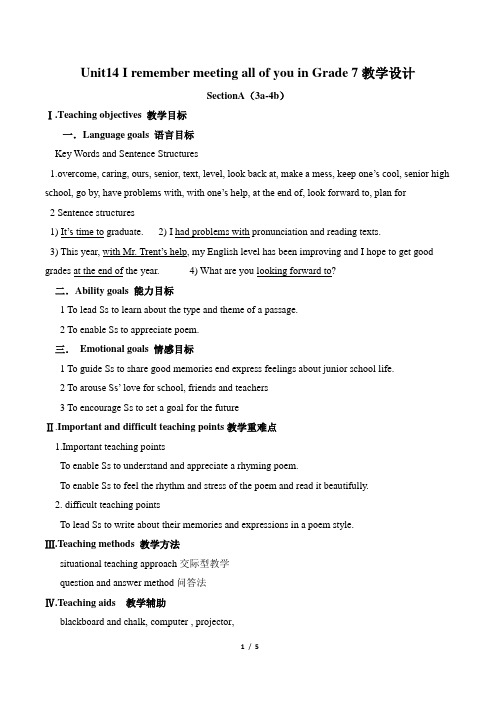
Unit14 I remember meeting all of you in Grade 7教学设计SectionA(3a-4b)Ⅰ.Teaching objectives 教学目标一.Language goals 语言目标Key Words and Sentence Structures1.overcome, caring, ours, senior, text, level, look back at, make a mess, keep one’s cool, senior high school, go by, have problems with, with one’s help, at the end of, look forward to, plan for2 Sentence structures1) It’s time to graduate. 2) I had problems with pronunciation and reading texts.3) This year, with Mr. Trent’s help, my English level has been improving and I hope to get good grades at the end of the year. 4) What are you looking forward to?二.Ability goals 能力目标1 To lead Ss to learn about the type and theme of a passage.2 To enable Ss to appreciate poem.三.Emotional goals 情感目标1 To guide Ss to share good memories end express feelings about junior school life.2 To arouse Ss’ love for school, friends and teachers3 To encourage Ss to set a goal for the futureⅡ.Important and difficult teaching points教学重难点1.Important teaching pointsTo enable Ss to understand and appreciate a rhyming poem.To enable Ss to feel the rhythm and stress of the poem and read it beautifully.2. difficult teaching pointsTo lead Ss to write about their memories and expressions in a poem style.Ⅲ.Teaching methods 教学方法situational teaching approach交际型教学question and answer method问答法Ⅳ.Teaching aids 教学辅助blackboard and chalk, computer , projector,Ⅴ.Teaching procedures 教学进程Step1. Lead-in and warming-up Activities1.Present some pictures about junior middle school life.2.Guide Ss to talk about their sweet memories using “remember doing ...”structure.【设计意图】通过展示图片,帮助学生回顾他们三年的初中生活,引起学生心底的共鸣,同时回忆上节课学习的内容,巩固句型的用法。
英语人教版九年级全册14单元教学设计

英语人教版九年级全册14单元教学设计UNIT14 教学设计一、教材分析本单元初中最后一个单元。
在这一单元里,大家一起回忆过去在三年里难忘的人和事,并且一起去畅想美好的未来。
本课为第二课时,我们大家一起去畅想我们这美好的未来。
二、三维目标(一) 知识与技能1. To learn how to describe future careers.2. To understand thepasage on Page 110.3. To learn thefollowing expressions: congratulate, none, ahead, responsible, separate等(二) 过程和方法4. To know how to talk about the future by practising and role-play.(三) 情感态度和价值观5. After learning thispart, every student will have a dream of his future career.三、教学重点1. How to use the following words andexpressions: congratulate, none,ahead, responsible, separate2. to understand the passage on Page 110.3. How to talk about future.四、教学难点1. How to use the following words andexpressions: congratulate, none,ahead, responsible, separate2. to understand the passage on Page 110.3. How to talk about future.五、教学策略根据本课教学目标和重点内容,教师可采用听,读,小组讨论,角色扮演等活动来引导学生进行学习。
人教新目标九年级英语Unit 14 Section A(1a – 2d)教案
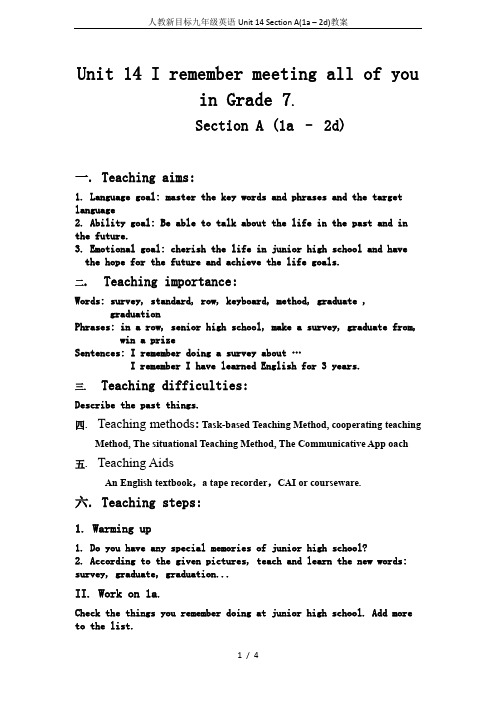
Unit 14 I remember meeting all of you inGrade 7.Section A (1a – 2d)一. Teaching aims:1. Language goal: master the key words and phrases and the target language2. Ability goal: Be able to talk about the life in the past and in the future.3. Emotional goal: cherish the life in junior high school and have the hope for the future and achieve the life goals.二. Teaching importance:Words: survey, standard, row, keyboard, method, graduate , graduation Phrases: in a row, senior high school, make a survey, graduate from, wina prizeSentences: I remember doing a survey about …I remember I have learned English for 3 years.三. Teaching difficulties:Describe the past things.四. Teaching methods: Task-based Teaching Method, cooperating teachingMethod, The situational Teaching Method, The Communicative App oach 五. Teaching AidsAn English textbook,a tape recorder,CAI or courseware.六. Teaching steps:1. Warming up1. Do you have any special memories of junior high school?2. According to the given pictures, teach and learn the new words: survey, graduate, graduation...II. Work on 1a.Check the things you remember doing at junior high school. Add more to the list.Practice in pairs using the information in 1a.At junior high school,I remember:_____winning a prize_____being a volunteer_____doing a school survey_____a friend helping me with a problemIII. Listening1. Listen and watch a video and learn about a graduation partythe record. Check the answer with the Ss.Learn the new word: standard2. Listen again and find out the general idea of the listening3. Challenge yourself: show out the Chinese phrases quickly and let students translate them into EnglishIV. Work on 1c.1. Watch and say: First, let students ask and answer about the shownpictures. Then, list some memories and experiences fromjunior high school. Share them with your partner.2. A special memory:Possible answers:My best memory is when I first started in Grade 7. Iremember ___(cut) grass. My classmates____ (be) tired and thirsty. Wu Jun hao___(bring) lots of water to us. We were all movedV. Language points1) remember用法总结:1. remember to do sth. 记得要做某(还没有做)2. remember doing sth 记得(某人)做过某事(已做过)3. remember sb /sth 记得某人或某事4. remember(that)+宾从想起…2) stop to do sth. 停下来去做某事stop doing sth. 停止正在做的事3) forget to do sth 忘记要去做某事(未做) 1)forget doing sth 忘记做过某事(已做)4) try to do sth努力,企图做某事try doing sth试验,试着做某事5). go on to do sth.意为“做完一件事,接着做另外一件事”,go on doing sth.意为“继续做下去(接着做同一件事)”6). can’t help to do sth.意为“不能帮忙做某事”.can’t help doing sth.意为“身不由己地去做某事”或“情不自禁地去做某事VI. Exploration1. I remember ____________ (receive) your letter2. L ittle Tom couldn’t help _______(cry) when he fell down3. He really regretted_________(make) such silly mistakes4. Don’t forget _________ (bring) your homework, Jane.5. Let’s stop __________ (relax) after working a long time.6. This bike needs______(repair) now.7. Mary was heard______(shout). What happened?VII.Graduation SpeechTeacher: It’s time for you to graduate from junior high school. I want you to make a gradation speech.A model:Hello, everyone! I come from Class_____, Grade ______.How time flies! We have studied and lived together for almost three years in our school.First, I remember_________________. Second, I will tell about the fruit of three years’ hard work. I have learned___________. Finally, I want to talk about my dream. I would like to be a/an_______ when I grow up.That’s all. Thanks for listening!VIII. HomeworkWhich teachers will you miss the most after junior high school?Which kind of teachers do you like better?Blackboard design:Unit 14 I remember meeting all of you in Grade7.Section A 1 (1a – 2d)Words: survey, standard, row, keyboard, method, graduate , graduationPhrases: in a row, senior high school, make a survey, graduate from, win a prizeSentences: I remember doing a survey about …I remember I have learned English for 3 years. Group work: Boys PK GirlsTeaching rethinking:本节课是一节听说课,教学目标主要是让学生敢于表达自己的观点,并分享美好的回忆.通过听说写让学生俩俩合作,小组合作探究的方式,通过反馈,我觉得目标达成的很好.在英语课上,我全力肯定学生的一切努力,保护、激励学生的一切创造欲和尝试。
新目标九年级Unit14英文教案-新人教[全套]
![新目标九年级Unit14英文教案-新人教[全套]](https://img.taocdn.com/s3/m/67573c66a32d7375a41780c2.png)
Unit 14 Have you packed yet?The First PeriodⅠ.Teaching Aims and Demands1.Knowledge Objects(1)Key Vocabularybathing suit, water, travel, guidebook, beach towel, street map(2)Target LanguageHave you watered the plants yet?Yes, I have already watered them.2.Ability Objects(1)Train students’ listening ability.(2)Train students’ communicative competence.3.Moral ObjectsHave everything in readiness before you do it.In this way, you can finish it perfectly or have a good time.Ⅱ.Teaching Key PointTarget LanguageⅢ.Teaching Difficult Points1.How to train students’ listening ability.2.How to train students’ communicative competence.Ⅳ.Teaching Methods1.Listening-and-answering activity to help the students go through with the listening material.2.Pairwork to make every student work in class.Ⅴ.Teaching Aids1.A tape recorder2.The blackboardⅥ.Teaching ProceduresStep ⅠRevisionT: Last week we finished Unit 13.In this unit, we learned how to talk about how things affect us.For example, Loud music makes me tense.That movie made her sad.Now I ask some students to make sentences with the structure…make me…S1: Parties make me excited.S2: School vacations make me happy.S3: That movie made me want to leave.S4: The story made me cry.S5: The awful picture makes me nervous.T: Very good.From today on, we will learn Unit 14.Now.I ask a student to come to the blackboard and write the numbers 1 to 20 on the blackboard.(After the student has written the numbers 1 through 5, start talking to the rest of the class)T: Has he written the number 1 yet?Class repeat the question.Has he written the number 1 yet?S s: Has he written the number 1 yet?T: (Pointing to the number 1 on the board)Yes, he has already written the number 1.Class repeat.Yes, he has already written the number 1.S s: Yes, he has already written the number 1.T: (Writing the word already on the blackboard)This is the word already.Class repeat.Already.Look at the blackboard.(pointing to the blackboard)Has he written the number 50 yet? Class repeat the question.Has he written the number 50 yet?S s: Has he written the number 50 yet?T: (Pointing to the highest number already on the blackboard)No, he hasn’t written the number 50 yet.Class repeat.No, he hasn’t written the number 50 yet.S s: No, he hasn’t written the number 50 yet.T: (Writing the word yet on the blackboard)Tish is the word yet.Class repeat.Yet.Now, look at the two words already and yet.Which one is used to talk about things that have happened in the past?SSs: Already.T: Yeah.Very good.So the other word yet is used to talk about things that will happen in the future.Yeah?SS: Yes.Step Ⅱ1aThis activity introduces key vocabulary and helps students review vocabulary they already know.Read the instructions aloud to the class.Say, Who can give an example of a beach vacation and sightseeing in a city? Ask a student to give the example.(bathing suit, travel guidebook)Get students to add some things to the lists under the two headings.A beach vacation and Sightseeing in a city.Have students do the work individually first.While they are working, walk around the classroom checking the progress of the students.Let students tell the class the words they wrote.Write the words on the blackboard.Read them and let students repeat.Then ask other students to add other words to the lists.Sample answersA beach vacation 1.bathing suit 2.beach towel 3.sunglasses Sightseeing in a city travel guidebook street map cameraStep Ⅲ1bThis activity gives students practice in understanding the target language in spoken conversation.Look at the picture.Ask, What can you see in the picture? (There is a family in the picture.They are getting ready for a beach vacation)Point to the box.Invite a pair of students to read the conversation to the class.A: Have you packed the beach towels yet?B: No, I haven’t.Look at the six chores on the list.Let students read each item, then ask different students to explain the meaning of each item in their own words.Make sure students understand the meaning of each item.Go through the instructions with the class.Point to the blank lines in front of each item in the list.Say, You will hear a family talking as they get ready to go on vacation.Listen carefully.Make sure what the family talks about and put a checkmark in front of each chore that is already done.Play the tape.The first time students only listen.Play the tape a second time.Now listen to the tape again.This time please put your checkmarks on the correct blanks.Check the answers with the whole class.Answers√packed the camera√watered the plantslocked the windows√bought a travel guidebookbought a street mappacked the beach towelsTapescriptWoman: Have you packed the beach towels yet?Boy: No, I haven’t.Can’t Judy pack them?Woman: No, she’s busy.Could you please water the plants?Boy:I’ve already watered them.Woman: Oh, thanks.Man: What about the travel guidebook and the street map?Woman: I’ve already bought the travel guidebook, but I haven’t got the street map yet.Man: That’s OK.I’ll get it.Have you packed the camera?Boy: Yes.I’ve already put it in my suitcase.Woman: Well, I guess that’s everything.Boy: Almost everything.We haven’t locked the windows yet.Step Ⅳ1cThis activity provides guided oral practice using the target language.Go through the instructions with the whole class.Look at the example in the box.Invite a pair of students to read it to the class.S A: Have you watered the plants yet?S B: Yes, I have already watered them.Tell students they will be making conversations with a partner.Look back at the chores in Activity lb.Say, Now look back at the chores in Activity lb.Make conversations talking about what the family members have already done and what they haven’t done yet, using words from the chores, such as packed the camera, locked the windows, bought a street map.While students are working in pairs, walk around the classroom and listen to some pairs.If necessary, offer language support.Then get several pairs of students to say their conversations to the class.Conversation 1S A: Have they packed the camera yet?S B: Yes, they have already packed the camera.Conversation 2S A: Have they bought a street map yet?S B: No, they haven’t bought a street map yet.Notes1.pack—(here)get ready for a journey by doing this2.guidebook—book for travellers, tourists, etc, with information about a place3.Have you watered the plants yet?Yes, I have already watered them: PresentPerfect Tense.The structure is have+ p.p.Pay attention to the two words already and yet.Already is used in affirmative sentences; while yet is used in negative and interrogative sentences.Step ⅤSummaryIn this class, we’ve learned some important words, such as water, travel, guidebook, beach towel.We’ve also learned the target language.Have you watered the plants yet? Yes, I have already watered them.Step ⅥHomeworkMake conversations in pairs to review the target language.Step ⅦBlackboard DesignUnit 14 Have you packed yet?Section AThe First PeriodTarget languageA: Have you watered the plants yet?B: Yes.I have already watered them.Unit 14 Have you packed yet?The Second Period Ⅰ.Teaching Aims and Demands1.Knowledge Objects(1)Key Vocabularyrefrigerator, garage, suitcase, clean out, put in, turn off(2)Target LanguageHave you watered the plants yet?No, I haven’t.Have you packed the camera yet?Yes.I’ve already put it in my suitcase.Have you fed the cat?No.I haven’t fed her yet.2.Ability Object(1)Train students’ listening ability.(2)Train students’ speaking ability.3.Moral ObjectWe must be ready with our work before we do it.Ⅱ.Teaching Key Points1.Key Vocabularyclean out, put in, turn off2.Target LanguageHave you watered the plants yet?No, I haven’t.Have you packed the camera yet?Yes.I’ve already put it in my suitcase.Have you fed the cat?No.I haven’t fed her yet.3.StructuresHave you packed the camera yet?Yes.I’ve already put it in my suitcase.Have you fed the cat?No.I haven’t fed her yet.Ⅲ.Teaching Difficult Points1.the target language2.How to train students’ listening ability.Ⅳ.Teaching Methods1.Listening method to improve the students’ listening ability.2.Pairwork to make every student work in class.Ⅴ.Teaching Aids1.A tape recorder2.The blackboardⅥ.Teaching ProceduresStep I RevisionCheck homework.Get some pairs to read their conversations.Collect their conversations and help students correct any mistakes.Step Ⅱ2aThis activity provides guided listening practice using the target language.Look at the picture.Ask, What can you see in the picture? (A boy and a girl are in the kitchen.They both look a little stressed out)Go through the instructions with the class.You will hear a boy and a girl talking about getting ready to go on vacation.Write M after each thing that Mark says and T after each thing that Tina says.Look at the sample answer.Say, Tina said, No.I haven’t cleaned out the refrigerator yet.Get students to repeat No.I haven’t cleaned out the refrigerator yet.Play the recording for students the first time.This time students only listen to the recording.Play the recording a second time.This time let students write Min front of Mark’s statements, and T in front of Tina’s statements.Check the answers with the class.Answers1.T 2.T 3.M 4.T 5.M 6.TTapescriptBoy: Mom and Dad said they want to leave in ten minutes.Are you ready, Tina?Girl: No.I haven’t cleaned out the refrigerator yet.I have to do that right now.Boy: Tina! You’re unbelievable.What about your bike?Girl: I’ve already put it in the garage.But I haven’t locked the garage yet.That’s your job, Mark.Boy: I know.I’ve already done most of my jobs.I’ve taken out the trash.Girl: Have you fed the cat yet?Boy: Not yet.I’ll do it in a minute.Have you turned off your radio?Girl: Yes, I have.I think we’re almost ready.Step Ⅲ2bThis activity provides guided listening practice using the target language.Go through the instructions with the class.Look at the list of questions with blanks in front of each one.Then look back at the statements in Activity 2a.Say, Some of the statements in Activity 2a are answers to questions in Activity 2b.Write the number of the correct answer from Activity 2a in front of each question in Activity 2b.Get several students to read the questions in Activity 2b to the class.Look at the sample answer.Ask a student to read the question and answer to the class.Are you ready, Tina?No, I haven’t cleaned out the refrigerator yet.Play the recording for students.Let students write their answers in the blanks.Play the recording again if necessary.Correct the answers.AnswersHave you fed the cat yet? 5What about you bike? 2Are you ready, Tina? 1Have you turned off your radio? 6Step Ⅳ2cThis activity provides guided oral practice using the target language.Look at the sample conversation in the speech bubbles.Invite a pair of students to read it to the class.S A: Are you ready, Tina?S B: No.I haven’t cleaned out the refrigerator yet.Go through the instructions with the class.Say, With your partner make a conversation using information from Activities 2a and 2b.Have students work in pairs.While they are working, walk around the classroom checking the progress of the pairs and offering help as needed.Invite two pairs to say their conversations to the class.Conversation 1S A: Have you fed the cat yet?S B: Not yet.I’ll do it in a minute.Conversation 2S A: Have you turned off your radio?S B: Yes, I have.Step ⅤGrammar FocusLook at the grammar focus box.Get three students to read the questions and answers to the class.Have you watered the plants yet?No, I haven’t.Have you packed the camera yet?Yes.I’ve already put it in my suitcase.Have you fed the cat?No.I haven’t fed her yet.Let students make up other sentences in pairs using have you…yet questions.For example: Have you had lunch yet? Have another student answer truthfully: Yes, I have or Yes, I have already had lunch, or No, I haven’t had lunch yet.Pay attention to the use of already and yet.Say, When we use the words have and already, we are talking about something that happened in the past, but not a long time ago.When we use the words haven’t and yet, we are talking about something that will happen in the future, but not a long time from now.It will happen soon.For example: I’ve already had breakfast, but I haven’t had lunch yet.Draw a simple diagram to help students understand the grammar focus.Get some pairs to say their sentences aloud to the class.A sample sentenceI’ve already had lunch, but I haven’t had supper yet.Culture noteMany Americans are used to taking at least one vacation trip a year.But in China, some of the students may not be in the habit of taking an annual vacation, or even making a trip to another city.For some students, financial limitations and family obligations make such travel impossible.For others, it may be that taking trips is not something that is common in their home culture.Step ⅥSummaryIn this class, we’ve learned key vocabulary clean out, put in, turn off and the targetlanguage Have you watered the plants yet? No, I haven’t.Have you packed the camera yet? Yes, I’ve already put it in my suitcase.Have you fed the cat? No.I haven’t fed her yet.Step ⅦHomeworkGet students to write some sentences according to the target language.Step ⅧBlackboard DesignUnit 14 Have you packed yet?Section AThe Second PeriodTarget languageA: Have you watered the plants yet?B: No, I haven’t.A: Have you packed the camera yet?B: Yes, I’ve already put it in my suitcase.A: Have you fed the cat?B: No.I haven’t fed her yet.Unit 14 Have you packed yet?The Third PeriodⅠ.Teaching Aims and Demands1.Knowledge Objects(1)Key Vocabularychop, wood, light, village, well, farm(2)Target LanguageHave you bought a newspaper?Yes, I’ve already bought a newspaper.2.Ability Objects(1)Train students’ integrating skills.(2)Train the ability of expressing students’ own opinions.3.Moral ObjectsWe should make a plan for our everyday activities and make a schedule.It can remind us how to spend the time.It is good for our study and life.Ⅱ.Teaching Key PointTrain students’ integrating skills.Ⅲ.Teaching Difficult PointHow to improve students’ integrating skills.Ⅳ.Teaching Methods1.Fast-reading method2.Groupwork and pairworkⅤ.Teaching Aids1.A projector2.The blackboardⅥ.Teaching ProceduresStep I RevisionT: Yesterday we learned the target language.The structure is Have you…yet? Yes.I’ve already…Have you…?No.I haven’t…yet.Now who can make sentences using the structure?S1: Have you turned off your radio yet?S2: Yes.I’ve already turned it off.S1: Have you finished your homework?S2: No.I haven’t finished it yet.T: Very good.Step Ⅱ3aThis activity provides reading practice using the target language.Show the key vocabulary words on the screen by a projector.chop v.砍;劈wood n.木头;木材light v.点燃;点着village n.乡村;村庄well n.井;水井farm n.农场;农庄Read the words and ask students to repeat again and again until they can pronounce the wordsfluently and accurately.Before reading the e-mail message, ask the students what chores do you usually do? Please tell me.(do my homework, clean my room, water the plants, clean our classroom etc.)Go through the instructions with the class.Look at the e-mail message.Let a student read the e-mail aloud to the class.Correct any pronunciation errors to make sure the student is providing a good model for the rest of the class.Get students to read the e-mail message individually, and underline the different chores on their own,Check the answers with the class.Answers1.do my homework2.take the dog for a walk3.water my mom’s plants4.do some shopping5.chop wood6.light the fire7.collect water8.feed the animalsLet students read the e-mail again for further comprehension.While they are reading.Walk around the classroom, offering help if they have any words or phrases they don’t understand.Notes1.chore—small duty or piece of work, especially ordinary everyday task(in the home, on a farm, etc.)In the e-mail message, there are many chores, such as do my homework, take the dog for a walk, water my mom’s plants.2.chat—talk about unimportant things3.kid—(sl)child; young person4.well—(here n.)shaft, usually lined with brick or stone, for obtaining water from an underground source5.anyway—in any possible way; by any possible meansStep Ⅲ3bThis activity provides reading, writing.listening and speaking practice using the target language.Look at the pictures of the three people and read their names aloud to the class.Then point to the chart.Let students read the information in it.Make sure students understandthe information in the chart by asking questions and point out things.T: Look at the three pictures above the chart.Under each person is a list of the things he or she has done or will do today.Now look at the chart.What do you see in the first column?S1: Numbers.Clock times.T: That’s right.Those are clock times.Those times show what the three people were doing at 9:00,at 10:00,and so forth.It is 12:00 noon now.so the 1:00 and 2:00 times show things they will do later today.What has Steve already done?S2: He’s already done his homework.He’s already bought a newspaper.He’s already fed the dog.T: That’s correct.What things hasn’t he done yet?S3: He hasn’t watered the plants.He hasn’t cleaned his room.T: OK.Very good.Go through the instructions with the class.Put students in several groups.Say, Each student in a group will decide to be one of the people.The other students in the group will ask questions to find out which person in the chart he or she has decided to be.Make sure students understand how to do the exercise.Look at the example in the box.Invite a pair of students to read it aloud to the class.S A: Have you bought a newspaper?S B: Yes, I’ve already bought a newspaper.Ask students, which of the three people could it be? Can you find out? Yeah.It could be Steve or Elise.Get students to do the work in groups.While they are working, move around the classroom checking the work of each group.Ask two groups to do the work as the examples.Group 1: Have you watered the plants?S1: Yes.I’ve already watered the plants.Group 2: Have you fed the dog?S2: No.I haven’t fed the dog yet.(Person 1: Kathy; Person 2: Elise)Step ⅣPart 4This activity provides reading, writing, listening and speaking practice using the target language.Go through the instructions with the class.Invite a good student to give an example of things that he or she has and hasn’t done this week: Ihave done my homework.But I haven’t done some shopping.Put students in some groups of three.Let students complete the work in groups.Finish the table.Review the task.Get some groups to share the results of their surveys.Sample answersYou Li Hong (student’sname)Wang Bin (student’sname)Things I have done Science project Plan CleaningThings I haven’t done yet homework Shopping WashingOptional activityAsk students to write their own schedules, listing the time of day they do each thing.Then get students to work in pairs.Student A thinks of one activity.Student B gets five tries to guess the activity.Then student B thinks of an activity and student A guesses what it is.Step ⅤSummaryIn this class, we’ve learned some key vocabulary words such as chop, wood, light.village, well, farm.We’ve also done a lot of reading, writing and speaking practice using the target language.Step ⅥHomework1.Finish off the exercises on pages 57~58 of the workbook.2.Get students to talk about the things they have done and they haven’t done yet this week in pairs.Step ⅦBlackboard DesignUnit 14 Have you packed yet?Section AThe Third PeriodTarget language:A: Have you bought a newspaper?B: Yes, I’ve already bought a newspaper.Unit 14 Have you packed yet?The Fourth PeriodⅠ.Teaching Aims and Demands1.Knowledge Objects(1)Key Vocabularymember, original, songs, award(2)Target LanguageHave they been on TV yet?Yes, they’ve been on TV lots of times.2.Ability Object(1)Train students’ speaking and listening ability.(2)Train students’ ability to understand the target language in spoken conversation.(3)Train students’ ability to use the target language.3.Moral ObjectLove music and you can benefit from it.Ⅱ.Teaching Key Points1.Key Vocabularymember, original, songs, award2.Target LanguageHave they been on TV yet?Yes, they’ve been on TV lots of times.Ⅲ.Teaching Difficult Points1.How to train students’ speaking and listening ability.2.How to use the target language.Ⅳ.Teaching Methods1.Listening method2.Groupwork to make every student work in class.Ⅴ.Teaching Aids1.A tape recorder2.The blackboardⅥ.Teaching ProceduresStep I RevisionCheck homework.Ask some pairs to say their conversations to talk about the things they have done and they haven’t done yet this week.S A: Have you done your homework?S B: Yes, I’ve already done my homework.S A: Have you cleaned your room?S B: No, I haven’t cleaned my room yet.Step ⅡPart 1This activity introduces key vocabulary, and helps students review vocabulary they already know.Look at the picture.Ask, What can you see in the picture? (A man is playing the guitar and singing a song)Point to the box.Invite a student to read the four questions.Make sure students understand the questions.Get students to fill in the blanks on their own.A moment later, ask several students to read their answers to the class.Notes1.favorite—(adj.)best liked2.What is your favorite band?—What band do you like best?3.band—group of persons who play music together4.band member—member of a bandStep Ⅲ2aThis activity gives students practice in understanding the target language in spoken conversation.Look at the picture.A record agent is interviewing members of a band.Let students read the instructions.Point to the headings and the blank lines following each heading.You will hear a woman interviewing members of a band.They are talking about the band.Now, listen and write your answers on these blank lines.Play the recording the first time.This time students only listen.Play the recording a second time.This time, ask students to write their answers on the blank lines as they listen to the recording.Play the tape again if necessary.Check the answers with the class.AnswersBand’s name: Apple Ice CreamHow long they’ve been together: About a yearNumber of concerts they’ve done: SixTapescriptWoman: Hmmm.That was…umm…not bad.Now tell me a little about yourselves.What was your name again?Boy 1: Apple Ice Cream.Woman: Apple Ice Cream? That’s uhhh …a nice name.Hong long have you been together? Boy 1: About a year.Woman: One year, huh? And have you written any original songs yet?Boy 2: Yes, we have.We used to play stuff by other bands, but now we only play our own songs.That one you just heard was ours.Woman: Good, great! I’m interested in people who play their own music.Have you ever won anaward of any kind?Boy 1: Yes, we have.We won the best new group of the year last month.Woman: Wow.That’s great.Have you made a music video yet?Boy 1: No, not yet.Woman: But you’ve had your own concert?Boy 2: Oh, yeah.We’ve had six concerts of our own.Woman: Have you ever been on TV?Boy 1: No, we haven’t.But we’ve already talked to "Bands on Parade" about doing a TV show next month.Woman: Sounds like you guys are on your way.Step Ⅳ2bThis activity provides listening practice using the target language.Go through the instructions with the class.Look at the list of things the band may or may not have done.Get different students to read the list.Make sure students understand the task.You will hear the same recording again.This time please listen and check the things the band has already done.Point to the sample answer.On the recording you hear that the band has already written some original songs so you check that answer.If necessary, play the recording again.Then get students to put checkmarks in front of the correct answers.Check the answers.Answers√written original songsmade a music video√won an awardbeen on TV√had concertsNotes1.original—newly formed or created, not copied or imitated2.award—(here)a prize in a competition3.video—televisionStep Ⅴ2cThis activity provides guided oral practice using the target language.Look at the sample conversation in the box.Invite two students to read it to the class.S A: Have they been on TV yet?S B: Yes, they’ve been on TV lots of times.Go through the instructions with the class.Talk about your favorite bands with your partner.Let students work in pairs.As they work, walk around the classroom checking the progress of the pairs and offering help as needed.A moment later, invite two pairs to say their conversations to the class.A1: Have they written any original songs yet?B1: Yes, they’ve written several original songs.A2: Have they had their own concert yet?B2: Yes, they’ve had five concerts of their own.Step ⅥSummaryIn this class, we’ve learned some key vocabulary, such as member, original, songs, award.We’ve also learned the target language.Have they been on TV yet?Yes, they’ve been on TV lots of times by listening and speaking.Step ⅦHomeworkTalk about some bands using the target language, and write down the conversations.Step ⅧBlackboard DesignUnit 14 Have you packed yet?Section BThe Fourth PeriodTarget language:A: Have they been on TV yet?B: Yes, they’ve been on TV lots of times.Unit 14 Have you packed yet?The Fifth PeriodⅠ.Teaching Aims and Demands1.Knowledge Objects(1)Key Vocabularyhit, appear, tour, miss, lead singer, mostly, top ten, good luck, off to a great start(2)Practise reading an article.(3)Practise writing something using the target language.2.Ability Objects(1)Improve students’ integrating skills—reading skill and writing skill.(2)Improve students’ speaking ability by groupwork.3.Moral ObjectIt is good for us to listen to music in the busy life.Music can make us relaxed, and we can work better.Ⅱ.Teaching Key PointPractise reading and writing using the target language.Ⅲ.Teaching Difficult Points1.How to improve students’ reading ability.2.How to improve students’ speaking ability by groupwork.Ⅳ.Teaching Methods1.Reading method to improve students’ reading ability.2.Writing method to improve students’ writing ability.3.Pairwork to make every student work in class.Ⅴ.Teaching Aids1.A projetor2.The blackboardⅥ.Teaching ProceduresStep I RevisionRevise the target language presented in this unit.Check homework.Ask some pairs to read out their conversations.Step Ⅱ3aThis activity provides reading practice using the target language.Teach the new words.Show the new words on the screen by a projector.scene n.(戏剧、歌剧等)的发生地点;背景last adj.最近的;最后的major adj.较大的;较大范围的hit n.成功而轰动一时的事物(如歌曲等)appear v.出现;露面;(公开)演出miss v.错过;遗漏lead n.主角;领导mostly adv.主要地;大部分some day 来日;将来某一日be off 离开;走开air n.(音乐)曲调;旋律;乐曲poem n.诗;韵文Read the words and ask students to repeat them again and again until they can pronounce them correctly and fluently.。
人教版新目标九年级英语Unit14SectionA1(1a2d)第一课时优秀教学案例

(一)情景创设
1.真实的语境:在课堂中,我会利用图片、视频等多媒体教学资源,为学生创设真实的语境,让学生在特定的环境中感受和体验英语语言的应用。例如,通过展示污染严重的城市图片,让学生直观地感受到环境保护的紧迫性,从而激发他们的学习兴趣。
2.故事引导:以一个与主题相关的故事为主线,引导学生进入学习情境。例如,讲述一个因为环境污染而导致生物灭绝的故事,激发学生对环境保护的思考,引发他们对本节课内容的兴趣。
(二)问题导向
1.引导学生提出问题:在教学过程中,我会鼓励学生积极思考,提出问题。例如,在介绍环境保护的方法时,引导学生思考:“我们应该如生通过讨论、实践等方式,共同解决问题。例如,针对减少污染的问题,让学生分组讨论并提出具体的解决方案,然后进行分享和交流。
4.多元化评价:在教学过程中,我采用形成性评价和终结性评价相结合的方式,对学生的学习过程和结果进行全面评价。这种评价方式有助于我及时了解学生的学习状况,为下一节课的教学提供有力依据。同时,我还鼓励学生进行自我评价和同伴评价,培养他们的自主学习和评价能力。
5.教学反思:在教学过程中,我时刻保持对教学的反思,思考自己在教学过程中的优点和不足,以及如何改进教学方法和策略。这种教学反思有助于我不断提高自己的教学水平,为学生提供更优质的教学服务。
在教学评价方面,我采用了形成性评价和终结性评价相结合的方式,对学生的学习过程和结果进行全面评价。通过评价,我能够及时了解学生的学习状况,为下一节课的教学提供有力依据。同时,我还鼓励学生进行自我评价和同伴评价,培养他们的自主学习能力。
二、教学目标
(一)知识与技能
1.学生能够准确理解并运用本节课的重点词汇和短语,如“protect the environment”、“reduce pollution”等。
新版人教版新目标九年级英语Unit14全套教案
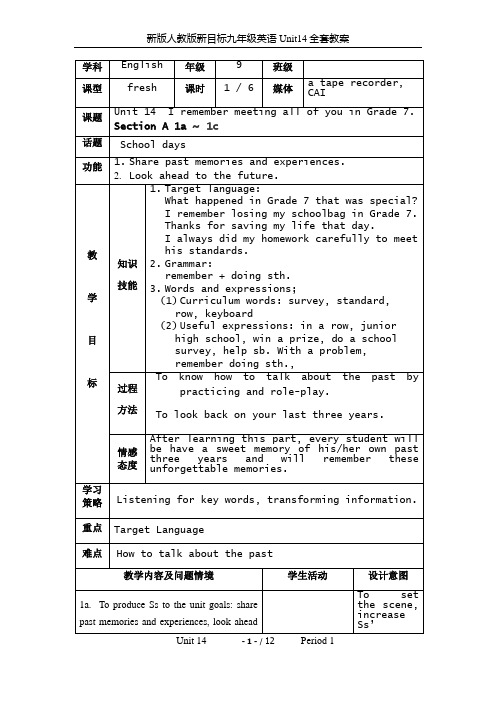
I remember meeting English 年级9 班级课型fresh 课时 5 / 6 媒体a tape recorder, CAI课题Unit 14 I remember meeting all of you in Grade 7. Section B 2a ~ 2e话题 School days功能9.Share past memories and experiences.10.Look ahead to the future.教学目标知识技能1.Target language:I remember meeting all of you when youwere just starting Grade 7 at thisschool.You were all so full of energy andthirsty for knowledge.Our teachers and parents will be proud of us because we have grown up and can beresponsible for ourselves.2.Grammar:remember doing sth.3.Words and expressions;(1)Curriculum words: gentleman,graduation, ceremony, congratulate,thirsty, thankful, lastly, task,ahead, responsible, separate, wing(2)Useful expressions: first of all, bythirsty, for, be thankful to sb.,ahead of, be responsible, set out,separate from, be responsible forsth.过程方法To know how to talk about the future bypracticing and role-play.情感态度After l earning this part, every studentwill have a dream of his future career.学习策略Identifying text type and purpose: Quickly read through a text to see what kind of writing it is, who wrote it and why it was written.学科English 年级9 班级课型fresh 课时 6 / 6 媒体 a tape recorder, CAI课题Unit 14 I remember meeting all of you in Grade 7. Section B 3a~ self check话题 School days功能11.Share past memories and experiences.12.Look ahead to the future.教学目标知识技能1.Target language:Since then, I have made so many good friends and I share so many memories with them.Even though I am sad that junior high school is over, I am looking forward to new experiences in senior high!2.Grammar:the present perfect tenseeful expressions: even though, look forward to sth.过程方法To know how to talk about the future by practicing.情感态度After l earning this part, every student will have a dream of hisfuture career.学习策略Write a passage about the person or event: 1. Describe the person/event.2. Explain you feel about this person/event.3. Describe how this person /event has changed your life.重点Target Language难点 Writing教学内容及问题情境学生活动设计意图3a. To prepare Ss to write using the targetlanguage.Homework assignment3b. To provide Ss with writing practice using thetarget language.。
人教新目标英语九全Unit14SectionB(2a2e)教学设计

(一)导入新课
1.教师播放一段名人的访谈视频,引导学生关注名人的成就和经历。视频结束后,教师提出问题:“What do you know about the celebrity? Can you share some of their achievements and experiences?”
a.学生可以通过网络、书籍等多种途径收集资料,培养信息检索能力。
b.教师在课堂上组织知识竞赛,检验学生课后作业的完成情况。
a.学生积极回答,教师对学生的回答给予肯定和鼓励。
b.教师根据学生的回答,简要介绍本节课将要学习的内容。
2.引导学生回顾已学过的时态知识,为新课的学习做好铺垫。
(二)讲授新知
1.教师通过PPT展示本节课的生词和短语,并结合语境进行讲解。
a.学生跟随教师朗读,注意模仿正确的发音和语调。
b.教师讲解生词的用法,并结合例句进行说明。
a.学生在小组内展开讨论,教师巡回指导,给予建议。
b.每组选派一名代表进行汇报,其他学生认真倾听,共同学习。
(四)课堂练习
1.教师设计以下练习:
a.填空题:让学生根据课文内容,用适当的时态填空。
b.阅读理解题:让学生阅读相关文章,回答问题,提高阅读理解能力。
c.写作练习:让学生撰写一篇关于自己心目中名人的短文。
b.设计阅读理解题,检测学生对文章内容的理解程度,并及时给予反馈。
c.组织课堂讨论,让学生分享阅读心得,提高他们的跨文化意识。
3.创设情境,让学生撰写一篇关于自己心目中名人的短文,巩固所学知识。
a.教师提供写作框架,引就和经历。
b.学生在写作过程中,教师进行个别指导,帮助学生解决语法和表达问题。
2.讲解一般现在时、一般过去时和一般将来时的综合运用。
人教版九年级英语全册Unit14SectionA1(1a–2d)教学设计

难点:正确运用一般将来时描述未来的发明和环保措施,以及在实际语境中运用所学词汇和语法。
2.重点:听力策略的培养,如预测、关键词定位等。
难点:提高学生在听力过程中的信息捕捉能力和理解能力,尤其是对长对话和短文的理解。
3.重点:阅读策略的运用,如快速阅读、细读等。
2.针对听力教学:
-在听力活动前,引导学生进行预测,培养学生的预测能力。
-在听力过程中,关注学生的反应,适时给予提示,帮助他们捕捉关键信息。
-听力活动后,组织学生进行讨论,复述听力内容,提高他们的语言表达能力。
3.针对阅读教学:
-引导学生通过快速阅读把握文章主旨,通过细读获取详细信息。
-教授学生阅读策略,如分析文章结构、找出主题句等,提高他们的阅读理解能力。
-完成本节课一般将来时和一般现在时的语法练习,提高学生对两种时态的运用能力。
-请学生运用这两种时态,描述一幅关于未来环保发明的图画。
3.阅读与写作:
-阅读一篇关于环保的文章,完成相关阅读理解题目。
-根据阅读文章,结合本节课学习的知识,撰写一篇关于未来环保发明的小短文。
4.口语练习:
-与同学合作,进行角色扮演,模拟一次关于环保发明的采访。
3.引导学生阅读课文,分析文章结构,学习环保主题的表达。
-示例:找出文章中的主题句,分析作者如何描述未来的环保发明。
(三)学生小组讨论
1.教师提出讨论话题,学生分小组进行讨论,共同完成讨论任务。
-话题示例:“Imagine you are an inventor in the future. What kind of invention would you like to create to protect the environment?”
人教新目标九年级英语第十四单元精品教案

Unit14 I remember meeting all of you in Grade 7教学设计SectionA(3a-4b)Ⅰ.Teaching objectives 教学目标一.Language goals 语言目标Key Words and Sentence Structures1.overcome, caring, ours, senior, text, level, look back at, make a mess, keep one’s cool, senior high school, go by, have problems with, with one’s help, at the end of, look forward to, plan for2 Sentence structures1) It’s time to graduate. 2) I had problems with pronunciation and reading texts.3) This year, with Mr. Trent’s help, my English level has been improving and I hope to get good grades at the end of the year. 4) What are you looking forward to?二.Ability goals 能力目标1 To lead Ss to learn about the type and theme of a passage.2 To enable Ss to appreciate poem.三.Emotional goals 情感目标1 To guide Ss to share good memories end express feelings about junior school life.2 To arouse Ss’ love for school, friends and teachers3 To encourage Ss to set a goal for the futureⅡ.Important and difficult teaching points教学重难点1.Important teaching pointsTo enable Ss to understand and appreciate a rhyming poem.To enable Ss to feel the rhythm and stress of the poem and read it beautifully.2. difficult teaching pointsTo lead Ss to write about their memories and expressions in a poem style.Ⅲ.Teaching methods 教学方法situational teaching approach交际型教学question and answer method问答法Ⅳ.Teaching aids 教学辅助blackboard and chalk, computer , projector,Ⅴ.Teaching procedures 教学进程Step1. Lead-in and warming-up Activities1.Present some pictures about junior middle school life.2.Guide Ss to talk about their sweet memories using “remember doing ...”structure.【设计意图】通过展示图片,帮助学生回顾他们三年的初中生活,引起学生心底的共鸣,同时回忆上节课学习的内容,巩固句型的用法。
人教版新目标九年级英语Unit14单元集体备课教案
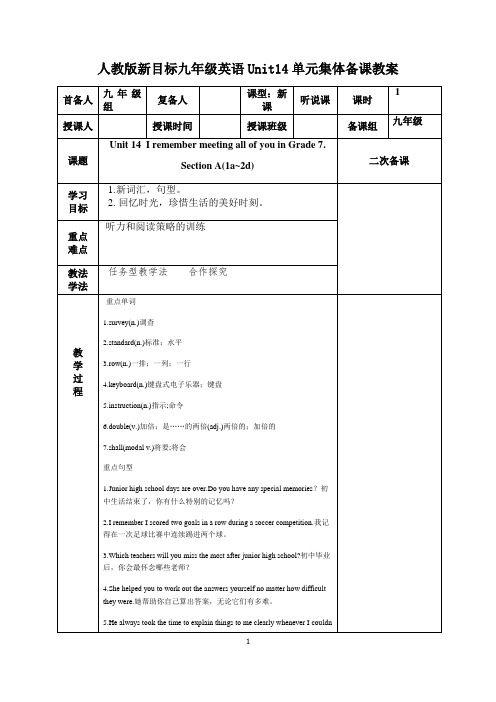
人教版新目标九年级英语Unit14单元集体备课教案t understand anything.无论何时只要是我没听懂的,他总是花时间给我解释清楚。
6.Because of her,I put in more effort and my exam scores doubled.正是由于她,我才更加努力,我的成绩也成倍地提高了。
§自主学习方案学生想一想,说一说,写一写。
Teacher: What did you look like five years ago?What do you look like now?(2分钟)【新词自查】根据句意及汉语提示完成句子。
1.The students are doing a school survey(调查)about their eating hobbits.2.The workers are making the products carefully to meet the standard(标准)of the international.3.His father was so angry that he broke the keyboard(键盘)of his computer.4.This page has the clear instruction(说明)of this kind of medicine.5.The man did the same job as us but was paid double(双倍的).Step 1 情景导入用多媒体给学生播放一些七至九年级学生们学校活动的录像或照片,然后询问同学们还记得哪些学校活动。
Teacher:Your junior high school days are over.Do you have any special memories?Students:I remember.①winning a prize②taking part in the school trip③getting into a fight with my friends…环节说明:通过视频和课前的一个师生问答互动引入新课的话题。
